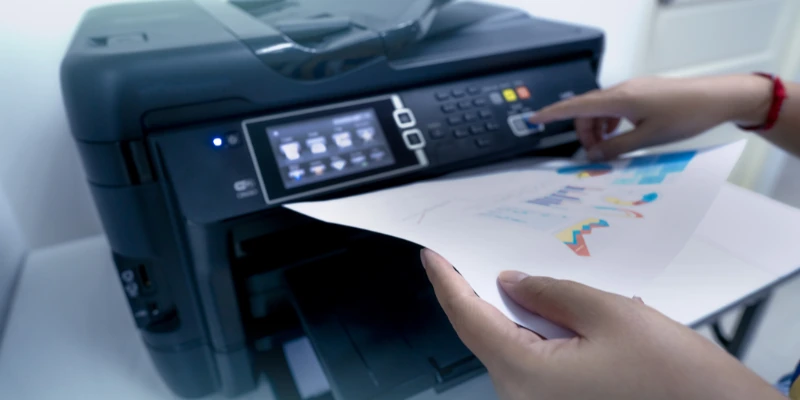Importance of Printers A Must-Have for Every Workspace
Published: 12 Apr 2025
Computers have become an essential part of modern life. Over 4.5 billion people use computers and the internet daily for work, education, and entertainment. From businesses managing data to students learning online, computers simplify tasks, improve efficiency, and connect the world like never before. But why are they so important? Let’s explore the importance of printers:
1. Essential for Offices and Businesses
Offices rely heavily on Printers for daily tasks like printing invoices, reports, contracts, and presentations. Even in the digital age, printed documents are necessary for official meetings and client communications. Many businesses use printers for marketing materials such as brochures, flyers, and banners. A physical copy ensures that important information is available even if a computer crashes or a file is accidentally deleted. Without printers, business operations would become slow and inefficient.
2. Important for Education and Learning
Students and teachers benefit greatly from printed study materials, notes, and assignments. Reading printed content is easier on the eyes compared to screens, helping students focus better. Many schools and colleges require printed project reports and essays for submission. Printers allow teachers to prepare worksheets, lesson plans, and educational posters for classrooms. Despite the rise of e-books, physical textbooks and notes are still widely preferred.

3. Convenient for Personal Use at Home
Having a printer at home makes life much easier for everyday tasks. You can print important documents, tickets, or even your favorite photos instantly. Parents use printers to print worksheets and crafts for kids, while individuals use them for resumes and forms. Instead of rushing to a shop or waiting in long queues, a home printer provides immediate access to hard copies. It’s a small investment that saves time and effort in the long run.
4. Critical for Government and Legal Work
Government offices, law firms, and courts require printed documents for official records, agreements, and contracts. Many legal documents still need a physical signature and stamp to be legally valid. Printed copies serve as permanent records, preventing data loss or manipulation. Voter IDs, passports, and birth certificates are all physical documents issued with the help of printers. Even today, most legal and government processes rely heavily on printed paperwork.
5. Useful in Healthcare and Medical Fields
Hospitals and clinics use printers to generate prescriptions, patient records, and medical reports. A printed prescription is easier to read and less prone to misinterpretation compared to handwritten notes. Hospitals use printed wristbands for patient identification to ensure safety and accuracy. Many medical devices are integrated with printers to produce instant test results. The healthcare industry depends on printers to maintain organized and efficient records.
6. Helps in Banking and Financial Transactions
Banks and financial institutions print transaction receipts, account statements, and important agreements daily. Even with mobile banking, customers still need printed bank statements for official purposes. Cheques, loan agreements, and tax-related documents require physical copies for legal verification. ATMs also use printers to provide transaction receipts for customer records. The financial sector heavily depends on printers to maintain transparent and secure records.

7. Supports Creativity and Design Professionals
Graphic designers, photographers, and artists use high-quality printers to bring their creative work to life. Many professional printers produce high-resolution images, posters, and custom designs for clients. Personalized gifts, greeting cards, and art prints are made using advanced printing technology. Even hobbyists enjoy printing their artwork or DIY projects at home. Printers play a big role in the creative industry, allowing designers to showcase their work effectively.
8. Helps in Real Estate and Architecture
Real estate agents use printers to create brochures, property listings, and contracts for clients. Architects rely on large-format printers to print blueprints, floor plans, and designs. Physical copies of architectural designs help in discussions and approvals with clients and construction teams. Many builders still prefer printed documents for on-site reference rather than viewing plans on a screen. Printing is a crucial part of planning and executing construction projects.
9. Essential for Event Planning and Invitations
Event organizers, wedding planners, and businesses use printers to create invitations, tickets, and posters. Many events, including weddings, corporate meetings, and concerts, require printed passes or entry badges. Custom invitations with high-quality designs add a personal touch to special occasions. Even in a digital world, people love receiving beautifully printed invitations and thank-you cards. Printers make it easy to produce event materials in bulk without compromising on quality.
10. Provides Backup and Security for Important Documents
Having printed copies of important files ensures that you don’t lose data due to technical failures. Digital files can be lost due to hacking, viruses, or system crashes, but a printed copy remains safe. Official documents like birth certificates, contracts, and tax papers are often required in physical form. Many companies keep printed backups of essential records to avoid any legal or operational risks. Printers help create a reliable backup for critical information, providing peace of mind.
Computers help us work faster, learn new things, and stay connected with others. They make tasks like online shopping, banking, and communication easy. Without computers, life would be slower and more complicated.
Students use computers for online learning, research, and homework. They can watch educational videos, read e-books, and take online tests. Computers make studying more interactive and fun.
No, computers can help in learning, but they can’t replace teachers. A teacher explains things, answers questions, and understands emotions. Computers are just tools to support education.
Businesses use computers to store data, send emails, and manage finances. They help in making quick decisions and improving customer service. Many companies also use computers for online marketing and sales.
Yes, too much computer use can cause eye strain and reduce physical activity. Cybersecurity risks, like hacking and viruses, can also be a problem. It’s important to use computers wisely and take breaks.
Doctors use computers to store patient records, check medical reports, and even perform surgeries. Hospitals use them to track medicines and appointments. Computers also help in medical research and disease detection.
Start with simple tasks like typing, using the internet, and sending emails. There are many free online courses and YouTube videos for beginners. Practicing daily will help you become more comfortable with computers.
Computers allow us to send emails, chat on social media, and make video calls instantly. We can talk to people anywhere in the world in seconds. This makes communication faster and more convenient than ever.
Always use strong passwords and update your software regularly. Install antivirus programs to protect against viruses and hackers. Avoid clicking on unknown links or downloading suspicious files.
Yes! Computers are getting smarter with artificial intelligence and faster processors. In the future, they may help in self-driving cars, advanced robots, and even space travel!
Conclusion
So guys, in this article, we’ve covered the importance of computers in detail. Whether for work, education, or entertainment, computers have become an essential part of our lives. I personally recommend learning basic computer skills, as they can make everyday tasks easier and open up new opportunities. If you haven’t already, start exploring how a computer can help you today! What’s one way a computer has improved your life? Share your thoughts in the comments!

- Be Respectful
- Stay Relevant
- Stay Positive
- True Feedback
- Encourage Discussion
- Avoid Spamming
- No Fake News
- Don't Copy-Paste
- No Personal Attacks

- Be Respectful
- Stay Relevant
- Stay Positive
- True Feedback
- Encourage Discussion
- Avoid Spamming
- No Fake News
- Don't Copy-Paste
- No Personal Attacks
